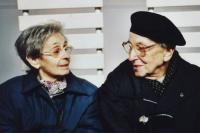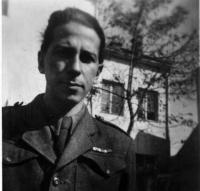You cannot convey the experience of war, unfortunately.

Download image
Vojtěch Gregor was born in 1918. He grew up and attended school in Liptovský Mikuláš in Slovakia. He is of Jewish descent. During his youth he sympathised with the Freethought movement. He studied chemistry in Prague, and after the occupation he returned to Slovakia where he took an active part in the resistance. He was arrested in 1940. After his release, he was drafted into military service without arms, serving with the Special Labour Corps (working in quarries etc.). The corps itself was penned for destruction in death camps. Even during the strenuous military service, he continued his resistance activities, keeping up contacts between political prisoners and their families. He carried on with this even after being released from duty in 1943 and sent to another camp. Before the Slovak National Revolt, he escaped the camp and joined the partisans. He took an active part in combat in the area between Liptov and Pohroní, was injured, and was flown by air to Lviv and Sochi. After the war he completed his chemistry studies at university. He was a member of the scientific team of professor Wichterle and worked at the Nuclear Research Institute Řež.Vojtěch Gregor was born in 1918. He grew up and attended school in Liptovský Mikuláš in Slovakia. He is of Jewish descent, during his youth he sympathised with the Freethought movement. He studied chemistry in Prague, after the occupation he returned to Slovakia and took an active part in the resistance. He was arrested in 1940, after his release he was drafted into military service without arms, serving with the Special Labour Corps (working in quarries etc.). The corps itself was penned for destruction in death camps. Even during the strenuous military service, he continued his resistance activities - keeping up contacts between political prisoners and their families. He carried on with this even after being released from duty in 1943 and sent to another camp. Before the Slovak National Revolt, he escaped the camp and joined the partisans. He took an active part in combat in the area between Liptov and Pohroní, he was injured and flown by air to Lviv and Sochi. After the war he completed his chemistry studies at university. He was a member of the scientific team of professor Wichterle and worked at the Nuclear Research Institute Řež.

